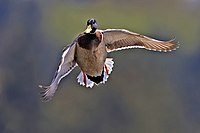H5N1 bird flu virus reaches Poland
Sunday, March 5, 2006
Two cases of the deadly H5N1 avian influenza virus have been confirmed in Polish birds. The H5N1 strain of bird flu has already been found responsible for the deaths of over 93 humans in the entire world. Some scientists fear it may be starting to establish a foothold in Eastern and Central Europe.
There have been isolated cases of H5N1 transmission from birds to humans, raising fears among the international scientific community that the virus will combine with a human influenza virus, mutating in such a way that it could transfer readily from human to human. A global pandemic, similar to the Spanish influenza outbreak of 1918, could result.

The two cases in Poland were discovered in the northern town of Toruń, famous as the birthplace of Nicolaus Copernicus. Two swans have been confirmed to have been carriers of the virus. Samples from the subjects have been sent to the European Union (EU) laboratories in Weybridge, England, but initial assessments have been seen as highly reliable. "Yes, we have confirmed that it is definitely H5N1," said Jan Zmudzinski, director of Poland's national laboratory, in the town of Pulawy. A hygiene-security zone protected by police has been established, extending up to several hundred metres from the spot on the river bank of the Vistula river where the swans were found.
Boud, a resident of Toruń, told Wikinews that he has observed authorities putting precautionary measures in place to attempt to slow the spread of bird flu. He said that during March 6 and 7 he observed:
- The establishment of an "inner zone" next to the Vistula river which has been cordoned off by police. No cars or non-residents are allowed to enter this area, which includes Philadelphia Boulevard ("Bulwar Filadelfijski"). Normally the riverbank is a popular place for casual walks and exercising dogs.
- The establishment of an "outer zone" including the entire town centre.
- Placement of special disinfection mats for people to walk over in the main intercity bus station ("PKS") in Toruń. The station is an entry and exit point to and from the outer zone.
- Placement of signs around the town instructing people that the feeding of birds is strictly prohibited.
- Placement of warning signs about infection risks under storks' nests in villages near Toruń.
- Authorities prohibiting transport of animals into or out from the quarantined zones.
- Disinfection "sand mats" on main roads out of Toruń, that vehicles must necessarily pass over to disinfect their tires.

The World Health Organisation held a three-day emergency meeting in Geneva, Switzerland, to discuss plans to deal with the virus, and also to revisit contingency plans for the possibility of a future pandemic. With the discovery of H5N1 in Poland, fears of a pandemic have increased in the scientific community. "Events in recent weeks justify that concern," said Margaret Chan, special advisor to the WHO on avian influenza.
While bird flu has not affected Europe's agricultural output as much as it has that of Southeast Asia, there have been some serious economic consequences of the recent bird flu outbreaks on the continent. France has been forced to increase its subsidies to poultry farmers, spending over 52 million euros ($63 million USD) in aid. Over thirty bird cases have been confirmed in France, while Germany is currently investigating a possible case in a cat.
Sources
- AFP. "H5N1 bird flu reaches Poland, experts fear pandemic" — Breitbart.com, March 6, 2006
- "Poland confirms H5N1 in wild swans" — Bangkok Post, March 6, 2006
- "Poland confirms first case of deadly H5N1 virus" — Reuters, March 6, 2006}
- AP. "Avian Flu Found in a German Cat" — LA Times, March 1, 2006
| |
This page has been automatically archived by a robot, and is no longer publicly editable.
Got a correction? Add the template {{editprotected}} to the talk page along with your corrections, and it will be brought to the attention of the administrators. Please note that the listed sources may no longer be available online. |



